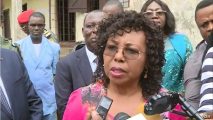8, March 2017
Philemon Yang Bamenda Mission stresses nothing as regards to the connectedness, contestedness and complexity of happenings in Southern Cameroons 0
Southern Cameroon’s pain commands international headlines, demands quick action and sets the scene for a geopolitical drama on Cameroon’s future power in the CEMAC-Sub Saharan region. The poor handling of the Anglophone crisis by the Biya Beti Ewondo regime is pushing the intractable conflict to get worse before it gets better. What can be done about it needs much more informed and constructive African Union debate, especially in Abuja which will bear many of the actual and potential consequences if Anglophones should secede from La Republique du Cameroun.
Since 2016, there has been a systematically Bokoharamization by troops loyal to the regime in Yaoundé of West Cameroon. For several months, Anglophone Cameroon has witnessed rapes, extra judicial killings and hundreds of abductions. The North West and South West CPDM political elites blame each other, with none citing the numerous atrocities committed against their own people by Francophone soldiers deployed to the region. The Cameroon Anglophone Civil Society Consortium and its leadership have been targeted. Internet connection in Southern Cameroons has been shut down. Unconfirmed reports say hundreds of innocent Southern Cameroonians youths have been killed and buried in mass graves in the Soa locality near Yaoundé. Prominent Anglophone judges and lawyers have been arrested. These are war crimes, documented on the ground and in appalling TV and social media footage.
The only prominent Anglophone citizen in the Biya regime, Prime Minister Yang Philemon has failed to take genuine actions to tackle the escalation, arising from La Republique du Cameroun’s ruthless military campaign to bully Southern Cameroonians to submission. The 84 year old President Biya’s failure to engage the Cameroon Anglophone Civil Society Consortium on the Anglophone crisis adds to uncertainty over the fragmented peace that reigns in the country.
Taking advantage
The political rhetoric coming out of Yaoundé has been very telling. Francophone media gurus have described the Anglophone people as “rats”. President Biya in his nationwide address said Anglophones were extremists and terrorists. Higher Education Minister, Fame Ndongo observed that Southern Cameroonians were like a fly in an ointment. The Biya regime is taking advantage of the division that exists among the Southern Cameroon groups both at home and in the Diaspora to assert its military and political roles in the territory while Abuja is cautious on supporting the Consortium for fear of an escalation into war with Biafra.
Whoever wins in this current Anglophone crisis will have to deal with an armed conflict in the nearest future. In the meantime, Prime Minister Philemon Yang is struggling alone to develop a coherent approach to the diplomacy on the Southern Cameroons crisis amid demands by Southern Cameroonians that the Biya Francophone government should do more by releasing all Anglophone detainees including the leaders of the Consortium, reinstate internet services in Southern Cameroons and engaged in meaning dialogue with the Cameroon Anglophone Civil Society Consortium.
Philemon Yang’s recent decision to tour the Bamenda province of Southern Cameroons could be seen as another form of provocation coming from the Yaoundé regime. The Prime Minister is in the North West with nothing to offer. To be sure, his trip stresses nothing as regards to the connectedness, contestedness and complexity of happenings in Southern Cameroons. Biya should be at the center of the diplomacy on Southern Cameroons not Philemon Yang. Philemon Yang does not have the political acumen and authority to open small spaces that can lead to sane political solutions on the Anglophone problem. The Prime Minister’s Bamenda trip is not a worthy endeavour.
By Soter Tarh Agbaw-Ebai





























8, March 2017
Explosive growth in Cameroon’s White weapon sale 0
White weapons and all dangerous objects that can kill are now sold on the streets or in bars in Cameroon. The phenomenon is growing at catastrophic rapidity in the nation’s capital, Yaoundé, Douala and in many towns and cities in the country.
Universities graduates who can find jobs are predominantly the vendors who sell knives and machetes, between 5000 and 10000 FCFA. This arms trade that takes place on the streets, precisely in the numerous bars is slowly but surely feeding the crime industry.
The Biya regime is aware of the dangers involved in the activities currently going on in the informal sector but has turned a blind eye due to its failure to resolve the issue of high rate of unemployment. According to recent figures, the unemployment rate in Cameroon is 15.5% in urban areas and 4.3% in rural areas. It is 8.8% for male youth and 23.5% for females. The overall underemployment is 84.8% among 15-24 year olds. While it is 73.1% in the 25-34 age group.
Consequently, young Cameroonians are rushing to the informal sector, to survive, hence the emergence of unframed activities such as the trading of white weapons and dangerous objects. Anyone can buy a machete or a knife in any part of the country for any purpose.
By Sonne Peter